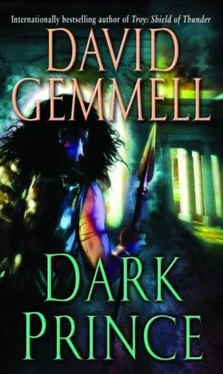David Gemmell - Dark Prince
Здесь есть возможность читать онлайн «David Gemmell - Dark Prince» весь текст электронной книги совершенно бесплатно (целиком полную версию без сокращений). В некоторых случаях можно слушать аудио, скачать через торрент в формате fb2 и присутствует краткое содержание. Год выпуска: 2011, ISBN: 2011, Издательство: Hachette UK, Жанр: Старинная литература, на английском языке. Описание произведения, (предисловие) а так же отзывы посетителей доступны на портале библиотеки ЛибКат.
- Название:Dark Prince
- Автор:
- Издательство:Hachette UK
- Жанр:
- Год:2011
- ISBN:9781405512107
- Рейтинг книги:4 / 5. Голосов: 1
-
Избранное:Добавить в избранное
- Отзывы:
-
Ваша оценка:
- 80
- 1
- 2
- 3
- 4
- 5
Dark Prince: краткое содержание, описание и аннотация
Предлагаем к чтению аннотацию, описание, краткое содержание или предисловие (зависит от того, что написал сам автор книги «Dark Prince»). Если вы не нашли необходимую информацию о книге — напишите в комментариях, мы постараемся отыскать её.
Dark Prince — читать онлайн бесплатно полную книгу (весь текст) целиком
Ниже представлен текст книги, разбитый по страницам. Система сохранения места последней прочитанной страницы, позволяет с удобством читать онлайн бесплатно книгу «Dark Prince», без необходимости каждый раз заново искать на чём Вы остановились. Поставьте закладку, и сможете в любой момент перейти на страницу, на которой закончили чтение.
Интервал:
Закладка:
Parmenion knew he had not convinced them, but the walk among the slain had become a ritual, a necessary ordeal — more, he realized, for himself than for the young men he forced to accompany him.
Silently he strode from the battlefield, back along the line of the river to where the horses were tethered, then he mounted and led his small company on to the former Persian camp.
The victory had been swift and terrifying.
The Persian army of around 45,000 men had fortified the far bank of the River Granicus, cavalry on left and right, mercenary infantry and Royal Guards — and the general Memnon — at the centre. By all the rules of engagement it should have produced a stalemate. But Parmenion had secretly sent men ahead to gauge the depths of the river. It had been a dry season and the water was only hip-deep, slow-moving and sluggish.
Alexander had led the Companion cavalry in a charge on the enemy's left flank. Parmenion ordered Philotas and his Thessalian horsemen to attack on the right. The shocked Persians were slow to react, and by the time Parmenion sounded the general advance their lines were already sundered. Only the mercenary infantry and the Royal Guard offered any stout resistance, the other units — and Memnon, the enemy leader — fleeing the field. It was a battle for less than an hour, a massacre for a further two.
Sixteen thousand Persians died before the sun reached its zenith.
The conquest of Persia was under way. Alexander's legend had begun.
That night, Alexander held his victory banquet in the tent of a dead Persian general. He had brought with him to Asia a Greek writer and poet named Callisthenes, a skeletal figure with a wispy black beard and an unnaturally large head which had long since outgrown the attempts of hair to cover it. Parmenion did not like the man but was forced to admit he had great skill as a saga poet, his voice rich and deep, his timing impeccable.
During the feast he performed an improvised work, after the style of Homer, in which he sang of Alexander's exploits. This was greeted by tremendous applause. The young King, it seemed, had personally slain 2,000 of the half-a-million Persians facing him, while Zeus, the Father of the Gods, stretched his mighty hand across the sky, opening the clouds to look down upon this mightiest of mortals.
Callisthenes sang of Athena, Goddess of War, appearing to Alexander and offering him immortality on the eve of the battle, and of the young King refusing the honour since he had not yet earned it.
Parmenion found the song stirring to the point of nausea, but the younger men clapped and cheered at each exaggerated point. Finally Callisthenes told of the moment when Alexander's generals had counselled against him crossing the 'swirling torrent of the Granicus', and gave the young King the answer that he 'would be ashamed if, after crossing the Hellespont, he allowed the petty stream of the Granicus to stand in his way'.
Hephaistion, who was sitting beside Parmenion, leaned in close. 'That is not the way it was,' he whispered.
'None of it is the way it was,' answered the general, 'but it sounds very fine to the young and foolish.'
The feast continued long into the night and, bored, Parmenion made his way back to his own tent. Mothac was still awake, sitting stretched out on a huge padded Persian chair. The Theban had been drinking.
'A wonderful day,' he said as Parmenion entered. 'Another nation ripe for conquest. More cities to be burnt and razed.' His face was flushed, his eyes bleary and red-rimmed.
Parmenion said nothing. Adding fuel to the brazier, he stripped himself of his ceremonial armour and stretched out on a long couch.
'Has the god-King grown tired of hearing stories about himself?' asked Mothac.
'Speak more quietly, my friend,' Parmenion advised.
'Why?' asked Mothac, sitting upright and spilling his wine. 'I have lived for more than seventy years. What can he do to me? Kill me? I wish I'd died ten years ago. You know, after the razing of Thebes I could not even find the grave of my Elea. My sweet Elea!'
'You will find her. She does not rest with the cloak of her body.'
Mothac wiped the back of his hand across his eyes. 'What are we doing here, Parmenion? Why don't we go home to Macedonia? Raise horses and leave this slaughter to the young men. What do we achieve here? More death, more destruction.'
'I am what I am,' replied the Spartan. 'It is all I have left.'
'You should not serve him. He is not like Philip, fighting to save his nation. He is a killer. He will build nothing, Parmenion; he will ride across the world as a destroyer.'
'I do not believe that. He is capable of greatness.'
'Why are your eyes so blind to his evil? What hold does he have on you?'
'Enough of this!' roared Parmenion. 'You are a drunken old man, full of bitterness and despair. I'll hear no more of it!'
'Drunk I may be, but I am not fooled by him.' Pushing himself to his feet, Mothac stumbled from the tent.
The old Theban sucked in great gulps of the cool night air and wandered away from the camp, out to a low range of hills to the south. He sat down against the hillside and lay back, trying to focus on the stars, but they swam around making him feel nauseous. Rolling to his side, he retched violently. His head began to pound and he sat up, the screwed-up parchment falling from his hand.
He picked it up, smoothing it out. Perhaps if he showed it to Parmenion? No, it would serve no purpose, he knew.
The report would be disbelieved. Parmenion was truly blind to any criticism of the young King.
The moon was bright and Mothac read once more the report from his agent in Pella. Much of it concerned the new regent, Antipater, left in charge of the army at home, with Olympias ruling as Queen. It also spoke of unrest in the western regions. But the last section spoke of the murder of Cleopatra and her baby son.
A palace servant talked of the double killing and was then murdered himself. All the slain man's friends, and the families of those friends, were removed from Pella and executed.
But the story survived, whispered among Alexander's enemies. It was surely too appalling to be true, wrote Mothac's agent. Alexander was said to have gone to Cleopatra's apartments and strangled her with a golden wire. Then he took the babe to the rooms of a foreign witch woman from Samothrace where, in order to ensure the success of his bid for the throne, he sacrificed the child to an unknown god — and then ate the babe's heart.
Sober now, Mothac stared at the parchment. A chill breeze blew at his back and he shivered.
'It is time to die,' hissed a cold voice. A searing pain clamped around Mothac's heart with fingers of fire. The old man struggled to rise, but the agony was too great and he sank back to the grass, the parchment fluttering from his fingers.
As it touched the ground the document burst into flames — writhing on the grass with dark smoke billowing from it.
Rolling to his belly Mothac tried to crawl, but a powerful hand grasped his shoulder and turned him to his back. He looked up and saw a pair of yellow, slitted eyes, and felt the long dagger slide under his breastbone.
Then all pain left him and the grass was cool against his neck. He remembered a day in a Thebes of long ago, when he had sat by a trickling stream with Elea beside him, her head resting on his shoulder.
The colours were bright, the greens of the cypress trees above him, the dazzling blue of the sky, the statues in the garden seemingly carved from virgin snow. Life had been beautiful that day and the future was brimming with the promise of further joy.
'Elea. .'he whispered.
Alexander rose slowly from the depths of a dark dream and drifted up towards consciousness, becoming aware first of the silk sheet covering his naked frame. It was luxurious and soft, clinging to his skin, warm, and comforting. He rolled to his back and noticed that his hand seemed to be coated with mud, the fingers stuck together. Opening his eyes, he sat up. The dawn light was bathing the outer wall of the tent and he lifted his hand to rub sleep from his eyes. He stopped and his heart began to hammer. Hand and arm were covered with dried blood, as was the bed. He cried out and dragged back the sheet, searching his body for a wound.
Читать дальшеИнтервал:
Закладка:
Похожие книги на «Dark Prince»
Представляем Вашему вниманию похожие книги на «Dark Prince» списком для выбора. Мы отобрали схожую по названию и смыслу литературу в надежде предоставить читателям больше вариантов отыскать новые, интересные, ещё непрочитанные произведения.
Обсуждение, отзывы о книге «Dark Prince» и просто собственные мнения читателей. Оставьте ваши комментарии, напишите, что Вы думаете о произведении, его смысле или главных героях. Укажите что конкретно понравилось, а что нет, и почему Вы так считаете.












